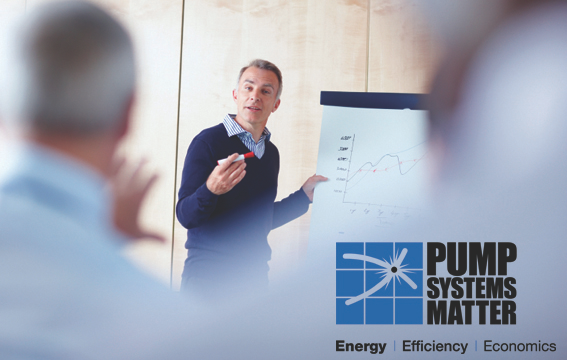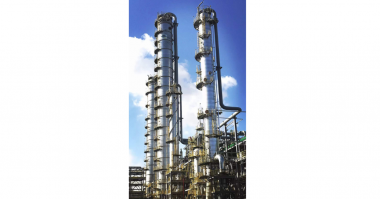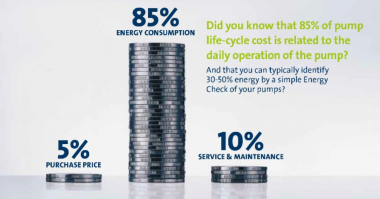I’m pleased to have recently joined the Hydraulic Institute, where I now have the opportunity to lead the Pump Systems Matter educational organization. And I’m pleased to join the ranks of Empowering Pumps as their latest “Industry Pro.” At Pump Systems Matter (PSM), we believe that the boundaries between experienced professionals and those that are new to the industry are not as separate and unrelated as they sometimes seem. The pump industry demands a life-long learning approach, as much of the education that is offered is derived “on the job.”
Experienced engineers in the industry are playing a critical role in sharing their knowledge. But, as David DeLong, in his book on the subject of “Lost Knowledge” attests, “Lost knowledge has been a problem throughout human history, but its significance has taken a quantum leap in the last generation.” Nothing could be more prescient than that statement in the pump industry today.
In the end, for any company, whether it’s new learners or experienced ones, a solid educational foundation leads to higher productivity and improved profitability. Knowledge and experience leads individuals to deliver more value to their company and customers. My thought is that pump and supplier OEMs can add substantial value to their customers and prospective customers by sharing knowledge through education and training.
It’s likely, however, that many pump manufacturers, and other companies that supply related products as part of the industry, are sometimes reluctant to incorporate a strong educational mission within their marketing efforts. Some certainly do; but, the knowledge gap in how pumps are selected, applied, maintained, and, certainly operated, suggests that we could, collectively, do a much better job.
Hydraulic Institute’s (HI) pump standards offer world-class knowledge – but it’s often not embraced. Many pumps based on DOE studies and field audits are not being operated at their Best Efficiency Point. Energy savings potential is dramatic – with improvements of 20% to 40% regularly identified through pump systems audits and assessments. This is just one example where better education and training could add value and contribute to an end-users’ bottom line savings. The payback is enormous.
Pump Systems Matter, with a focus on “energy, efficiency and economics” of pumping systems, has a role to play. At PSM, we believe that creating educational courses and offering solid training provided by experienced industry professionals is core to our mission and a unique organizational strength. We look to partner with others in the industry, whether pump or supplier OEMs, distributors, energy efficiency organizations or the myriad of pump users, to help address the issue of “lost knowledge” and new knowledge alike. Pump Systems Matter offers in-person training, webinars and e-Learning courses that help provide a pump and pumping systems knowledge base to assist employees and their companies to become more competitive, reach more customers, grow revenue while reducing their overall costs.
In developing new educational programs for those who are new to the pump industry or those who have decades of experience, Pump Systems Matter is forging new partnerships with corporations that maintain in-house training and those that don’t. The new “PSM Training Partner” program is an example of just one way that Pump Systems Matter and pump/supplier OEMs are working together. Through the existing Hydraulic Institute and PSM organizations, supported by member companies and PSM sponsor organizations, we are jointly developing curriculums and new training materials with corporations that meet the needs of new learners and the more senior learners, alike. PSM is well positioned to help internal sales groups, application engineers, pump distributors, and, ultimately, end users in this regard.
While jointly developing educational and training programs, each partner works closely together in exploring emerging trends and addressing growing pumping industry challenges to offer new solutions that lower energy consumption, improve reliability, lower maintenance costs and improve productivity and yields, which all leads to higher profitability and growth for all. PSM is, importantly, leveraging the 96 years of industry knowledge that HI members have developed in well-recognized standards and guidelines.
As partnerships expand within Hydraulic Institute/Pump Systems Matter with members and non-members, vertical niche markets, and the end user community, we will build a broader platform and stronger foundation that extends our reach into new educational areas that assist our pumping partners to further expand their knowledge and business success now and into the future. If we are creative, these types of partnerships can take our current engineering and technical knowledge into new areas and create new educational and training programs that will further fortify and expand our mission.
We welcome your thoughts (msullivan@Pumps.org), and invite you to visit our PSM website where we encourage your participation in one/more of the following upcoming courses:
- September 5th: Mechanical Seals (Part 1)
- September 9th: ANSI/HI Pump Test Standard for Water & Wastewater Applications
- September 12th: Mechanical Seals (Part 2)
- September 17th: Pump Systems Optimization: Energy Efficiency & Bottom Line Savings
- September 19th: Mechanical Seals (Part 3)
- September 24th: Pump Systems Optimization: Energy Efficiency & Bottom Line Savings
- September 26th: Mechanical Seals (Part 4)
An increasing number of pump and supplier OEMs are also hosting the “Pump Systems Optimization” day-long course to help their staff, distributors, customers and engineering consulting firms learn more on the topic of how to optimize pump systems. In doing so, they become a “Training Partner” with PSM and get to use our logo and leverage the use of our extensive webinar program to their employees and stakeholders. How about your company too? Please give me a call at: (973) 267-9700 x200 to discuss a PSO course, becoming a “Training Partner” or any thoughts you have on these matters.





[…] Because so much of our workforce will be retiring soon, we need to be thinking of ways to help build a body of industry knowledge. There are so many amazing men and women in the industry who have uncovered the best practices that […]